Conures, with their vibrant plumage and playful personalities, are popular pet birds known for their charm and intelligence.
One aspect of conure behavior that owners should be aware of is egg laying. While it is natural for female conures to lay eggs, owners need to understand the process and provide appropriate care.
If your conure is to lay eggs, you’ll notice changes in its nesting and mating behavior. The bird will have a swollen abdomen and increase its territory.
Let’s explore the signs of impending egg laying and what to do if your conure lays an egg. We will also discuss how to care for the eggs, common issues that may arise, and answer some frequently asked questions.
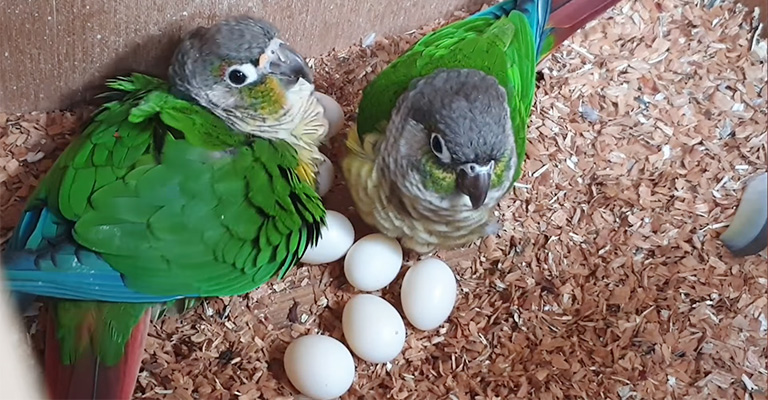
How Do I Know If My Conure Is Going to Lay An Egg?
Certainly! Here are detailed explanations for each point on how to determine if your conure is going to lay an egg:
Increased Nesting Behavior
Your conure may exhibit nesting behavior, such as shredding paper, plucking feathers, or carrying nesting materials like twigs or leaves to a specific location. This behavior indicates that your conure is preparing a suitable spot to lay its eggs.
Changes in Feeding Habits
Some conures may experience an increased appetite before laying eggs. They may consume more food, particularly those rich in calcium, such as leafy greens, fortified pellets, or calcium supplements. This additional calcium intake helps support eggshell formation.
Enlarged Abdomen
As the egg develops inside the conure’s body, its abdomen may visibly enlarge. The area around the Vent becomes rounder and more prominent.
However, it’s important to note that a swollen abdomen could also indicate other health issues, so consult an avian veterinarian to confirm if it is due to egg production.
Increased Territoriality
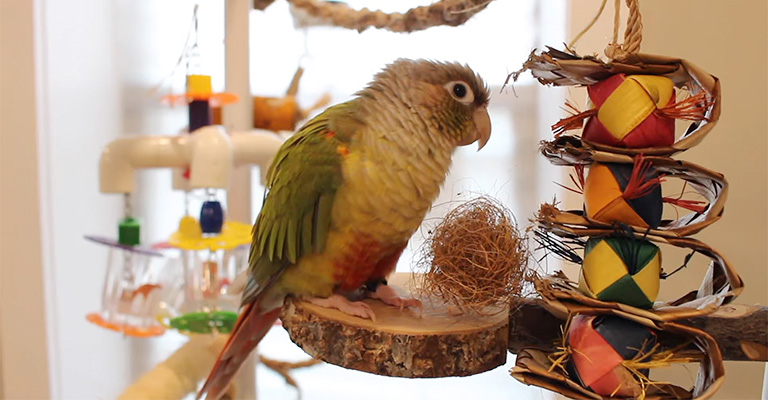
Conures can become protective of their nesting area, exhibiting territorial behavior. They may try to guard their chosen spot, such as a nest box or secluded corner, by displaying aggression towards other birds or even humans. This behavior is an instinct to protect the potential nesting site and future offspring.
Frequent Vent Visiting
A conure preparing to lay an egg may frequently visit its vent area. You may notice the bird sitting low on its perch, straining its abdomen, or even squatting on the cage floor. This behavior indicates that the conure is positioning itself to lay the egg through the Vent.
Restlessness and Vocalizations
The hormonal changes associated with egg-laying can make conures restless. They may exhibit increased activity, pacing back and forth on perches or cage bars.
Additionally, conures might vocalize more frequently, often emitting unique sounds or calls to express their hormonal state and potential readiness to lay eggs.
Increased Egg-Like Behaviors
As the conure approaches laying an egg, it may display behaviors similar to egg-laying motions. This can include straining its abdomen, mimicking pushing an egg out.
The conure might also exhibit nesting behaviors, such as arranging and rearranging nesting materials as if preparing a comfortable spot for the egg.
What to Do If My Conure Lays An Egg?
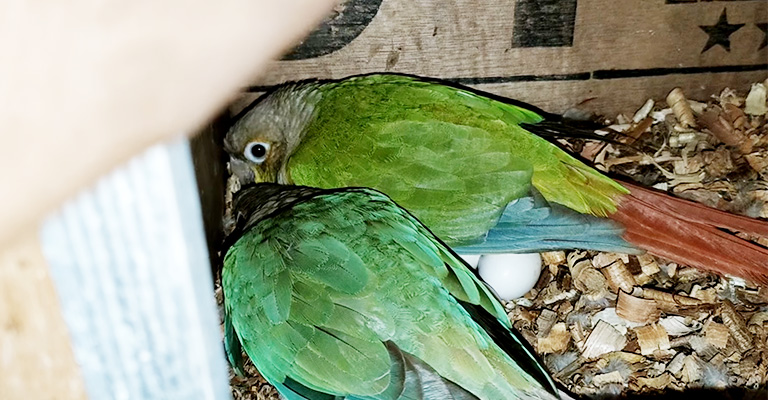
If your conure has laid an egg, here are some essential points and detailed explanations on what to do:
Leave the Egg Alone
It’s crucial to leave the egg undisturbed, as removing it can cause stress to the conure and potentially disrupt its natural breeding cycle. The conure will take care of the egg and provide the necessary incubation.
Provide a Suitable Nesting Area
Ensure your conure has a suitable nesting area that provides privacy and security. If you still need to, offer a nesting box or a secluded corner with soft nesting material, such as shredded paper or wood shavings. This helps create a comfortable environment for the conure to incubate the egg.
Maintain a Stable Environment
Keep the temperature and humidity levels in the conure’s environment consistent and within the appropriate range for its species.
Sudden changes in temperature or humidity can negatively impact the egg’s development. Avoid moving the cage or subjecting the conure to stressful situations during this time.
Provide a Balanced Diet
It’s essential to ensure that your conure receives a well-balanced diet, particularly during the egg-laying period. Offer a variety of fresh fruits, vegetables, high-quality pellets, and a small amount of seeds.
Additionally, provide calcium supplements such as cuttlebone or mineral blocks to support the conure’s calcium needs during egg production.
Observe the Conure’s Behavior
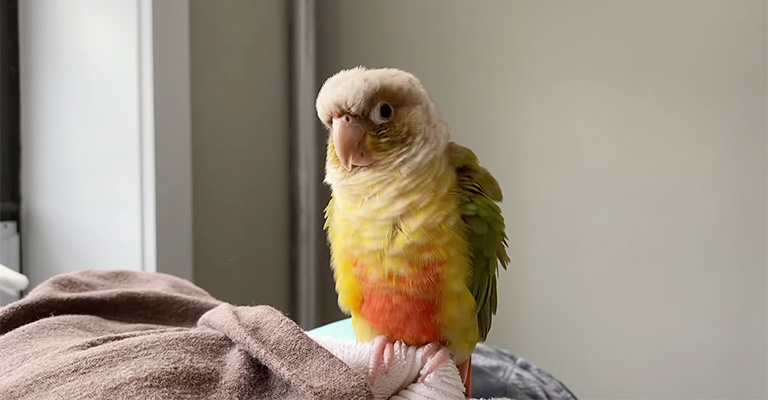
Keep a close eye on the conure’s behavior and health. Monitor its eating habits, activity levels, and overall demeanor. If you notice any signs of distress, weakness, or illness, consult an avian veterinarian immediately.
Please do Not Disturb the Nest
It’s important to avoid disturbing the nesting area or handling the eggs. Excessive handling can lead to stress or damage to the eggs, potentially affecting their viability. Allow the conure to carry out its natural incubation process without interference.
Monitor the Incubation Period
The incubation period for conure eggs can vary depending on the species, typically ranging from 20 to 30 days. Keep track of the approximate laying date and observe any changes in the conure’s behavior as the incubation period progresses.
If the egg does not hatch within the expected timeframe or the conure shows signs of neglecting the egg, seek veterinary assistance.
Seek Professional Advice if Needed
If you have any concerns or questions about the conure’s egg-laying process or encounter any complications or health issues, it’s essential to seek professional advice from an avian veterinarian. They can provide specific guidance based on your conure’s species and individual circumstances.
How to Care for the Newly Laid Conure Eggs?
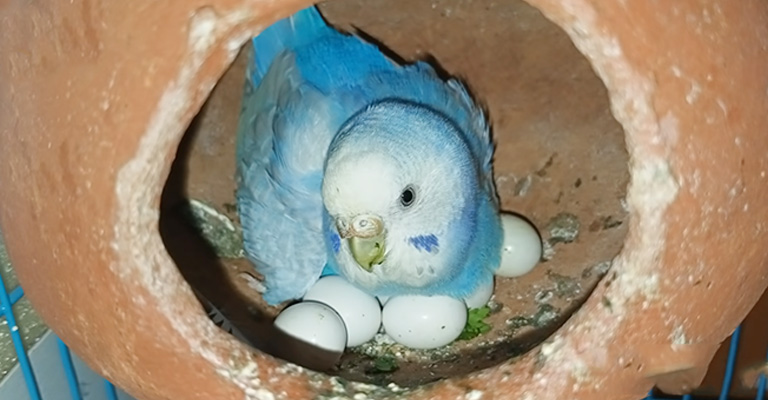
Caring for newly laid conure eggs requires special attention and care to ensure their viability and the health of the parent conure. Here are points on how to care for newly laid conure eggs:
Minimize Disturbance
Minimizing disturbance to the nesting area and the eggs is essential. Avoid handling the eggs unless necessary, as excessive handling can damage or disrupt the incubation process.
The conure’s instinct is to care for and incubate the eggs, so allow the parent conure to carry out its responsibilities without interference.
Maintain Stable Environmental Conditions:
Maintaining stable environmental conditions is essential to provide optimal incubation for the eggs. Ensure that the temperature and humidity levels in the conure’s environment remain consistent and appropriate for its species. Sudden changes in temperature or humidity can negatively affect the development of the embryos.
Provide Adequate Nesting Materials:
Ensure the nesting area has sufficient soft and comfortable egg materials. Shredded paper, wood shavings, or other suitable nesting materials can help provide insulation and support for the eggs. The nesting materials should be clean and free from chemicals or toxins that could harm the eggs.
Monitor Incubation
Keep track of the incubation period for conure eggs, which can vary depending on the species. Typically, conure eggs hatch within 20 to 30 days.
During this period, regularly observe the parent conure’s behavior and the condition of the eggs. If any complications or abnormalities arise, consult an avian veterinarian for guidance.
Maintain Proper Nutrition
Provide the parent conure with a well-balanced diet to ensure it has the necessary nutrients for proper egg incubation.
Offer a variety of fresh fruits, vegetables, high-quality pellets, and a small amount of seeds. Calcium supplements, such as cuttlebone or mineral blocks, are essential to support the parent conure’s calcium needs during this time.
Avoid Disturbing the Parent Conure
It’s crucial to avoid unnecessary disturbances to the parent conure during the incubation period. Loud noises, sudden movements, or constant handling can stress the bird, potentially leading to neglect or abandonment of the eggs. Maintain a calm and quiet environment around the nesting area to provide a sense of security for the parent conure.
Seek Veterinary Assistance if Needed:
If you notice any signs of distress or abnormalities with the eggs or the parent conure, seek veterinary assistance immediately. An avian veterinarian can provide professional guidance and help address any potential issues that may arise during the incubation process.
FAQs
No, only female conures can lay eggs. In avian species, including conures, only female birds possess the reproductive organs necessary for egg production.
The frequency of egg laying varies among conures and can be influenced by factors such as age, health, and environmental conditions. Some conures may lay eggs once or twice a year, while others may lay eggs more frequently.
It is best to allow the conure to complete the egg-laying process naturally. Prematurely removing the eggs can disrupt their hormonal cycle and potentially lead to further complications.
If your conure is experiencing difficulty or distress during the egg-laying process, it may be experiencing egg binding. Seek immediate veterinary assistance as this can be a life-threatening condition.
If you do not intend to breed your conure, it is best to avoid providing a nest box. The presence of a nest box can stimulate breeding behavior and lead to unwanted egg-laying.
Final Words
So, now you know all about conure egg-laying behavior. Understanding conure egg-laying behavior is essential for providing appropriate care and ensuring the well-being of your feathered friend.
By recognizing the signs of impending egg laying, knowing what to do if your conure lays an egg, and providing proper care throughout the process, you can promote a safe and healthy experience for both your conure and yourself.
Remember to consult with an avian veterinarian for personalized advice and guidance based on your conure’s specific needs.